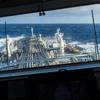Maersk Buying Back Shares, Earnings Up
Shares rise 5 pct after improved guidance, better quarter than expected. Maersk indicates more buybacks after first in its history. Efficiency, cost savings boost Maersk Line compared to rivals.
Denmark's A.P. Moller-Maersk announced the first share buy-back in its 110-year history on Tuesday as an overhaul of the sprawling shipping and oil empire leaves it with more cash than it can usefully invest.
Maersk shares jumped 5 percent after the company reported better than expected quarterly earnings and raised its 2014 profit guidance, as cost cuts at its container shipping arm help it navigate weakness in the global economy.
"The share buy-back program ... further underlines that the company has increased its focus on shareholders - this is a great signal," said Sydbank analyst Jacob Pedersen.
Maersk will buy $1 billion of its shares in the 12 months from Sept. 1 and said it would consider more buybacks later.
The largest container shipping company in the world and Denmark's second-largest company by market capitalisation suffered its first ever full-year loss in 2009 as the global economy slid into recession.
Under pressure to prove its diversified business model can work for shareholders, it has slashed costs and moved to focus on four businesses - container shipping, port terminals, oil exploration and production and oil drilling.
The conglomerate once owned businesses as varied as supermarkets, a small airline and liquefied natural gas tankers.
"The launch of the share buy-back program came earlier than I had expected, but given the company's strong financial position it makes good sense to start now," said Nykredit analyst Ricky Rasmussen.
STREAMLINING SHIPPING
Maersk raised its 2014 earnings guidance for the second time this year and now sees underlying profit of $4.5 billion, excluding discontinued operations, impairment losses and divestment gains, above a previous estimate of $4.0 billion.
Container shipping arm Maersk Line expects to earn profits "significantly" above those of 2013, it said. The business has been saving on bunker fuel costs by using its vessels more efficiently.
"They have optimized their route network earlier than their competitors and they have been better at slow-steaming. That is why they have been able to take market share from their competitors," Nykredit's Rasmussen said.
Many of Maersk's rivals are struggling to improve their results in the sluggish market. Germany's Hapag-Lloyd said it expected operating profit to drop this year while Singapore-based Neptune Orient Lines Ltd posted larger losses in the second quarter.
Maersk Line is the top operator on the Asia-Europe shipping routes, the busiest in the world. That sheer size has enabled it to take advantage of economies of scale and ensure it uses maximum capacity. It says it has idled some vessels while its ships use less fuel by not travelling as fast.
In the second quarter, it spent $1.3 billion on bunker fuel, which was 2.8 percent lower than the same quarter a year ago, despite increasing the volumes it transported by 6.6 percent. Bunker fuel prices fell 1.8 percent in that period.
It is also trying to make the most of its vast network of vessels and routes by sharing vessels, including in the latest deal with the world's second-largest shipper, privately-owned MSC Mediterranean Shipping Co.
The two companies hope such an agreement, which would span major global routes, would further cut costs and fuel use. They are in the process of submitting the plan to regulators and expect it to go ahead in the first half of 2015.
Maersk failed to push through a similar concept with MSC and a third company last year after China blocked the idea, fearing higher end prices for customers.
Maersk's profit in the second quarter rose to $2.25 billion, beating the average forecast of $2.21 billion in a Reuters poll of analysts..
The result reflected a $2.8 billion gain from the sale of Maersk's majority share in Dansk Supermarked and an impairment of $1.7 billion on Brazilian oil assets, which had not performed as well as expected.
Maersk Line earned profits of $547 million, boosted mainly through a 4.4 percent reduction in unit costs on more efficient bunker fuel use and also thanks to a 6.6 percent increase in volumes.
By Ole mikkelsen and Teis Jensen













